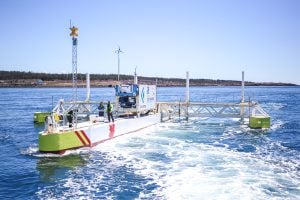
Environment
The truth about carbon capture
Carbon capture is big business, but its challenges fly in the face of the need to lower emissions. Can we square the circle on this technological Wild West?
- 5042 words
- 21 minutes
This article is over 5 years old and may contain outdated information.
Science & Tech

Céline Bak is the founder and CEO of Analytica Advisors, a research firm that launched the first national independent research on the Canadian clean technology industry. On May 27, Bak will participate in a discussion on new energy transitions at the Energy Council of Canada’s 2015 Canadian Energy Summit in Toronto. Below, Bak provides her top five Canadian energy innovations to watch right now.
Enerkem: Turning garbage into green fuel and renewable chemicals
This Canadian company designs, builds and operates the biorefineries that can turn our trash into clean fuels and chemicals, especially ethanol, the world’s most popular biofuel and now an integral component of the fuel we all put into our cars. The problem with ethanol historically, has been that it’s mostly made from sugar cane and other food crops, raising issues with land use and emissions associated with agriculture — until now. Municipal authorities are now able to turn any garbage that can’t be recycled into ethanol, methanol and biomethyl acetate (all important commercial chemicals).
Canadian Solar: Clean power for health and development around the world
Solar power generation is nothing new, but companies like Canadian Solar are now able to use solar energy to provide low-cost, reliable off-grid solutions for healthcare facilities, rural telecommunications networks, development sites and agriculture. Used this way, solar energy is a cheap, clean, low carbon and reliable power source that doesn’t have to be tied to the grid. Solar helps to manufacture and build generation plants as well as some of the most efficient and competitive photovoltaic components. This company is also pioneering new construction methods that allow solar power plants to blend easily into rural locations.
Westport: Making gas-powered transport a reality
Diesel fuel dominates the world of long haul and commercial vehicles and nothing else has ever come remotely close in terms of cost, fuel efficiency and ease of use for transport operators. But the emissions price we all pay, even with the new generation of high efficiency engines, is a high one. Natural gas and renewable gas made from waste is a much cleaner fuel with lower emissions and is used extensively for heating, cooking and power generation. But it has never really caught on in transportation, because of engine performance issues – it’s just never been as good. Westport has solved the problem of running trucks and heavy vehicles on natural gas without heavy conversion costs and without sacrificing the power and performance of the traditional diesel engines.
General Fusion: Safe, abundant, carbon-free energy?
Fusion energy is what powers the Sun. Here on Earth, it has the potential to transform our world, promising unlimited cheap energy from common source materials that will last for hundreds of millions of years without any emissions or harmful radiation. However decades after the theory of fusion energy became known and billions of dollars later, no viable fusion power system has been created that produces more energy than it consumes. This small Canadian company might just have a new approach to generating this energy that could be the answer we’ve been looking for.
Carbon Engineering: Fuel from thin air
We are producing too much carbon dioxide (CO_) and releasing it into the atmosphere and it’s changing our planet. But what if we could suck that CO_ out of the air around us and turn into a carbon neutral fuel? That’s the impressive ambition of Canadian firm Carbon Engineering, who are building the world’s first industrial scale CO_ air capture plant. The captured gas can be put back into the ground and stored, bottled and used as a normal industrial gas product, used to produce low-carbon oil products, and stimulate algal growth to make biofuels. Best of all, this carbon could potentially be turned into usable hydrocarbon fuel, compatible with existing transport infrastructure — literally fuel from thin air.
NRStore and Tesla Powerwall: Electricity storage in Canadian homes
Electricity is hard to store for long periods of time and in large quantities. Toronto-based NRStore has developed its own flywheel electrical energy system that allows power companies to regulate their grids and use less generating capacity to meet peak demand. But this system requires customers to store unused power in a battery. Tesla has recently announced the development of the Powerwall home battery, a game-changing small battery for customers’ homes and businesses, and NRStor will distribute it in Canada.
Are you passionate about Canadian geography?
You can support Canadian Geographic in 3 ways:

Environment
Carbon capture is big business, but its challenges fly in the face of the need to lower emissions. Can we square the circle on this technological Wild West?

Science & Tech
In the Bay of Fundy, technicians are putting a groundbreaking new tidal technology through its paces

Science & Tech
Where and how we live affect how much energy we consume. Here’s what Canada would look like if the provinces and territories were scaled to represent the amount of energy they use.

Science & Tech
The science behind the new Apple Watch Ultra, created for explorers